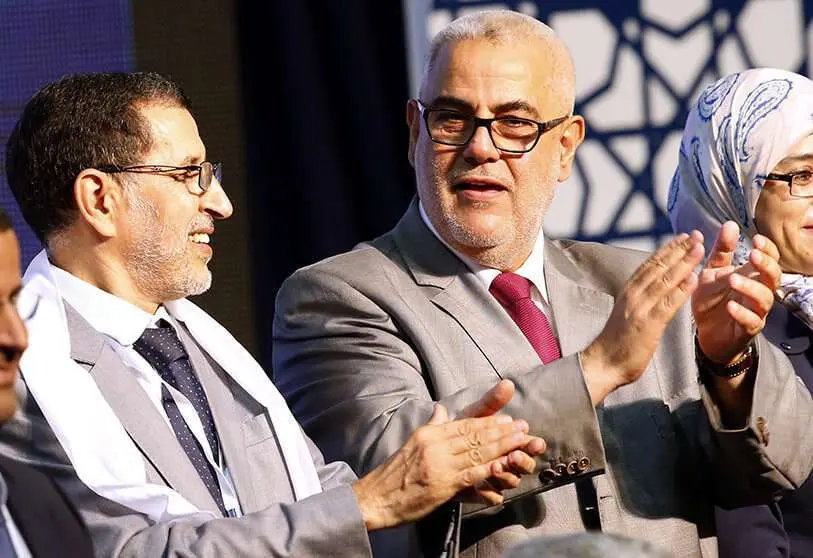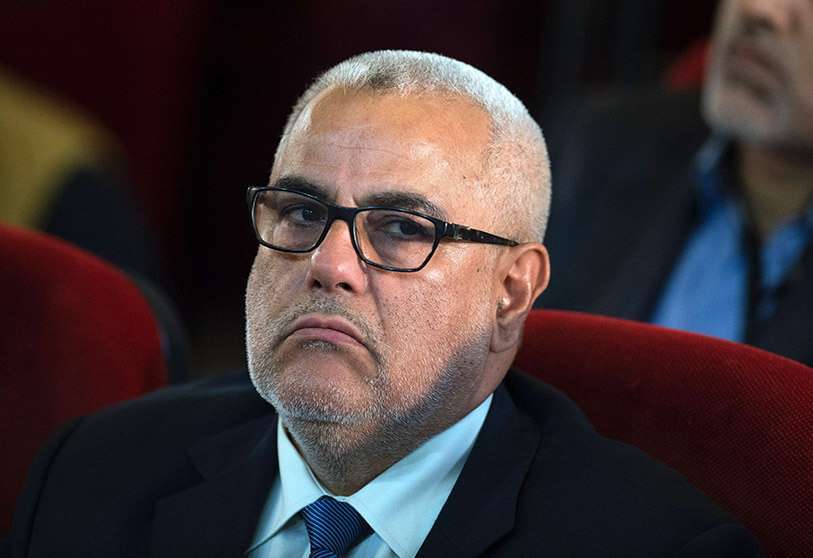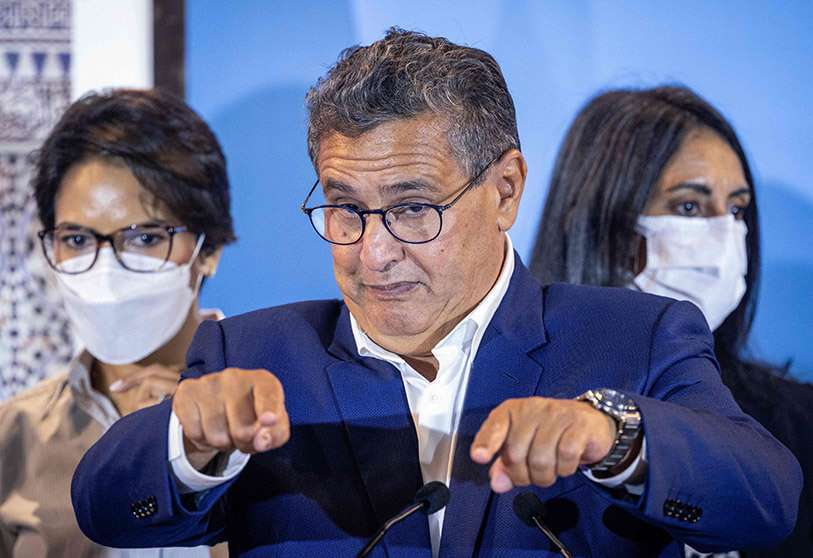Dimite al frente del PJD el islamista Saad Eddine El Othmani tras la debacle electoral

The Moroccan Interior Ministry in 2016 banned the publication of polls or election surveys in order to 'preserve the credibility and transparency of the process'. However, it is likely that none of them would have been able to predict the historic setback that the elections have caused for the moderate Islamists of the Justice and Development Party (PJD). The party, which had been the favourite, has lost 113 seats in the House of Representatives and has seen its territorial presence diluted with the loss of numerous mayoral seats.
The party has gone from 125 seats to just 12 in the space of five years, sharing eighth place in the lower house with irrelevant forces. Even the hitherto prime minister, Saad Eddine El Othmani, has failed to gain parliamentary representation. He has lost his seat in the midst of a metamorphosis that has turned the PJD into an insubstantial entity on the Moroccan political chessboard. The result puts an end to a decade of Islamist rule in the North African country.
The events of the last few hours have put Saad Eddine Othmani on the ropes. The former prime minister announced on Thursday that he was resigning from the party's general secretariat following the poor results and the avalanche of criticism from within and outside his party. The party's leadership, figures close to Othmani himself, have seconded their leader's decision and have also decided to abandon their posts within the PJD's organisation chart.

Abdelillah Benkirane, who was head of the executive between 2011 and 2017 at the head of the Justice and Development Party, has entered the scene to demand the resignation of Saaeddine Othmani as leader of the Islamist formation. "In these difficult conditions, the secretary general must assume his responsibilities and resign," he said on his social media profiles. Despite not holding any organic position within the party, Benkirane retains the authority that comes from having been the most popular and respected political figure in the country. He was the only one capable of gathering 20,000 people at a rally and seducing them with his oratory.
In March this year, Benkirane suspended his party membership because of deep disagreements with the government. A government led by his own party. Moreover, the charismatic Islamist leader had just stepped down as head of the executive branch in 2017 after winning the last elections. The protracted institutional deadlock, a period of five months without forming a cabinet, was the reason that prompted the monarch Mohammed VI to remove him from office and appoint Saad Eddine El Othmani as his replacement.
Four years after Benkirane's abrupt departure, the worst-case scenario predicted a loss of 40 seats for the Islamists. The passage in May of a controversial electoral law modifying the ballot and eliminating the minimum number of votes required for representation in parliament hurt the PJD. The measures were aimed at atomising parliament and reducing the institution's authority, argued the majority parties in the House. However, the most pessimistic of prognoses has fallen short.

The party, only 14 years old, had been ruling uninterruptedly in Morocco for a decade, backed mostly by the urban-based middle classes. This time, the electorate has not reciprocated. In recent months, the party has been exposed to a period of attrition and internal divisions caused by the implementation of a series of unpopular measures among its militants, such as the normalisation of relations with Israel, the legalisation of cannabis for therapeutic use and the regularisation of French in primary education.
Benkirane gave his successor a leg up on the issue of relations with the Jewish state. The former prime minister declared that this was "a decision taken by His Majesty", referring to Mohammed VI, and added that the monarch always takes "appropriate decisions". This testimony came as a surprise to locals and outsiders alike, as the Islamist leader's tense coexistence with the King of Morocco is notorious. Moreover, the bulk of the formation defends the Palestinian cause. By contrast, Benkirane was less sympathetic to cannabis regulation, a move that blew the bridges in his relationship with El Othmani.
The Islamists' dismal result contrasted with the rise of the Independent National Rally (RNI). The party led by the tycoon and hitherto Minister of Agriculture, Aziz Akhannouch, recorded a 60-point increase, winning 97 seats in parliament. Although far from an absolute majority, the formation of a government is now in his hands. The RNI will have to make pacts with other parties, but the head of the government will be his. It is foreseeable that Akhannouch will serve as prime minister despite having run 'a priori' for mayor of Agadir.

The centre-right force, known by its logo as the "Pigeon Party", is the junior partner in the coalition government with 37 seats. The small formation counts among its ranks technocratic profiles, renowned businessmen and high-ranking state officials. In this sense, the RNI's visible head has a close relationship with King Mohammed VI, which is why the Royal Palace would be satisfied with the result of the polls.
"We are not here to fight against another party, ideology or current", declared the new head of government after the results were announced. With its campaign slogan, "You're rocking something better" written in Moroccan Arabic instead of traditional Arabic, the RNI appealed to voters disenchanted with the political class and managed to dislodge the PJD from its theoretical centres of power. The party proposes a strengthening of the public sector, with prominent proposals in the health sector and a commitment to birth policies. At the same time, the party will seek to liberalise and revitalise the institutions.
For his part, the Secretary General and candidate of the Party of Authenticity and Modernity (PAM), Abdellatif Ouahbi, said that the election result was "a victory for democracy, our traditions and the Moroccan model". The leader of the second force in parliament announced that he would hold a meeting with the party's hard core in the coming days to assess the results and begin negotiations. In any case, Mohammed VI controls the "ministries of sovereignty", the portfolios of Interior and Foreign Affairs, Defence and Islamic Affairs. He also retains the power to appoint the prime minister. The rest is up for grabs.

The head of the interior ministry, Abdelouafi Laftit, declared that election day had taken place without incident and in an atmosphere of complete normality, and the US embassy in Rabat congratulated Morocco on the conduct of the vote. However, the Islamist party denounced electoral fraud, linked to a series of irregularities, vote-buying and attacks on PJD proxies in the vicinity of polling stations. In any case, we will have to wait for the conclusions of the international observers on the ground, who will make their pronouncements in the next few days.
The turnout rate rose eight points to 50.35% at the national level. A total of 8.7 out of 17.5 million registered Moroccans exercised their right to vote. The turnout at polling stations was, as usual, massive in the southern provinces, where the participation rate reached 66.94% in the region of El Ayoun-Saguia el-Hamra, 63.76% in the region of Guelmim-Rio Noun and 58.30% in the region of Rio de Oro-La Guera. All this taking into account the epidemiological situation.
The momentary disappearance of the PJD could take its toll on Morocco, according to some experts. The party has built a strong structure, unfathomable even for the rest of today's political forces. Moreover, the party has integrated into the system the Islamist sector, which, without representation, may find itself orphaned and looking for other options beyond the constitutional fences imposed in Morocco. In a way, the PJD has brought a certain legitimacy and stability to the country, and its disintegration could take its toll on the Alawi kingdom. A new phase is opening up.is regulation, a move that blew the bridges in his relationship with El Othmani.








